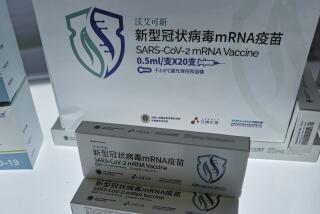China Puts Herbal Remedies to the Test
- Share via
HONG KONG — China’s testing of herbal remedies has for centuries been based on the word of the people who used the herbs.
But these days, modern research methods -- including tests on mice, then humans -- are being tried by a few drug companies that want a shot at the big profits that might come from marketing drugs in the United States.
The tests are part of a growing trend in a country where herbs have long been used with little recognition from the West.
It will be an uphill struggle, the herbal producers say. The U.S. Food and Drug Administration has never approved any Chinese -- or Western -- herbal drug, said Dr. Shaw Chen, associate director at the FDA’s Center for Drug Evaluation and Research in Rockville, Md.
He said about 40 clinical drug trials on herbals are underway in Hong Kong, mainland China, Taiwan and elsewhere, but declined to give details.
One herb being tested is huangqi, a yellow-rooted plant that may control swelling and promote skin regeneration. Researchers at the Chinese University of Hong Kong fed liquid made from huangqi to rats with diabetic foot ulcers -- before testing it on patients in local hospitals.
Scientists are also applying similar testing on dietary supplements, including Bak Foong pills, whose ingredients include deer antlers, ginseng and more than 20 other herbs.
The pills are popular among middle-aged and menopausal Chinese women who believe that Bak Foong enhances the immune system, improves digestion, regulates ovarian hormones and reduces the risk of heart problems.
Scientists saw no effect when it was tested first on young mice. Then they tried again with weak, older mice. Chinese University physiology professor Chan Hsiao-chang said she found that the diminished lymphatic cells -- a key component of the body’s immune system -- returned to a level similar to that in the healthy animals.
The FDA’s Chen notes that Chinese remedies that purport to treat a variety of ailments and cure the body as a whole, rather than a specific illness, can’t easily compare with the standards set for precise, single-compound Western drugs made from chemicals.
“We have not seen anything close,” Chen said, adding that Western pharmaceutical companies often spend huge amounts of money to gain FDA approval in a process that takes years.
In previous cases involving Chinese herbals, the FDA has cited problems such as the supplements’ failure to list all ingredients or to keep out contaminants.
In 2000, the FDA stopped imports of the Chinese herb family Aristolochia after reports of kidney failure among users in Britain and Belgium.
The Chinese drugs are backed by “mostly anecdotal experience and don’t have good quality data to meet modern standards,” Chen said.
Those in the Chinese drug industry say they’re improving their methods and achieving measured success by raising their manufacturing standards.
At 123-year-old drug maker Eu Yan Sang, salesman Li Chiu-ming recalls that when he started out 20 years ago, he sifted through herbs by hand, identifying them by shape, color, texture and smell and then heating them over firewood or burning charcoal before letting them dry out in bamboo sieves.
In 2001, the Singapore-listed company invested $2.6 million in a high-tech, dust-free plant in Hong Kong that executives say is comparable to those operated by Western drug makers.
“We used to work like a small, traditional family business,” Li said. “But now we are going high-tech and global.”
A colleague, Poon Hop, wore a surgical cap and lab coat as he greeted a reporter inside a sterile room with tightly controlled temperature and humidity where he chopped Chinese roots on a stainless steel surface.
The Hong Kong plant has been rewarded with a certificate for good manufacturing practice by Australia’s Therapeutic Goods Administration, which confirms its products are manufactured in conditions that are clean and free of contaminants.
That allows the company to export some products to the U.S. as dietary supplements. The certification would also be a necessary step toward getting any of the products approved as drugs.
More to Read
Sign up for Essential California
The most important California stories and recommendations in your inbox every morning.
You may occasionally receive promotional content from the Los Angeles Times.













